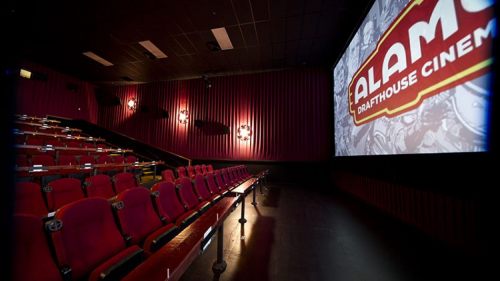The Alamo 100 Kicks Off with Charlie Chaplin’s CITY LIGHTS
Last night our friends at the Drafthouse invited us to a very, very special event to kick off the Alamo 100: a brand new series in which the programmers have selected their favorite films of all-time -- the films they couldn't possibly live without. As you know, with such a diverse programming team, the resulting list is nothing sort of exceptional, with titles ranging from Home Alone to Raging Bull. Our friend and programmer Sarah Pitre explained the process of selecting the titles and gave you guys a more formal introduction earlier today, and you can check that out -- as well as the glorious montage for the seven (!!!) titles they're showing in January -- by clicking here.
One of the films the programmers -- including Tim and Sarah -- were able to agree on was the Charlie Chaplin silent classic City Lights. Being only somewhat familiar with his short films, I've never watched a Chaplin feature in its entirety, and I was absolutely thrilled to get to experience City Lights at the Drafthouse, my favorite place in the whole world (besides my bed), for the very first time. See, that's kind of the point of the Alamo 100, and one of the missions of the Drafthouse: to introduce movie-lovers to new classics and old favorites, and build this ever-growing army of cinephiles who share their love of film in this church we call the Alamo. I can't tell you how many times the Drafthouse has helped shape my cinema experience and knowledge by introducing me to a hidden gem or an obvious hole in my viewing history. And there's no shame in admitting that I'd never seen a Chaplin film -- that's why the Drafthouse is there: to rectify that problem for me.
City Lights was definitely the perfect film to kick off this exciting new venture: made at a time when studios were transitioning to talking features and silent films were the way of the past, Chaplin was intent on proving that there was still an audience for his movies, that there was still a place for him in this evolving cinema landscape; that what he was doing still had value. The story follows the tramp as he falls in love with a poor blind girl who sells flowers for a living. She appreciates him for who he is because she doesn't see the surface of him: this raggedy, laughable bum. When he's not around her, he's getting mixed up with a suicidal rich guy, who only ever wants Chaplin around when he's drunk, making the tramp bend to his fickle whims -- which could be taken as a metaphor for big studios with lots of cash, who just toss it around heedlessly at whoever they find entertaining at the moment. But every morning, the rich man wakes up sober, disgusted by the tramp's presence, and kicks him out the door; they chew you up and spit you out.
See, all the tramp wants is to get a little money together to help this poor blind girl because he loves her and cares for her -- his life isn't of much consequence and he has nothing to lose. When he finally sees an opportunity to do so, he's blamed for a robbery he didn't commit, but he takes the fall for it, making sure she gets what she needs. This is a man who will sacrifice what little life he has for the sake of his love -- his art, if you will -- because money means nothing if you can't nurture that love. City Lights is an incredibly moving (and often hilarious, of course) film that highlights the power of cinema, from Chaplin's incomparable acting style to the fantastic score and the captivating love story.
It's a movie for people who love cinema, and I just can't imagine a better way to introduce people to what the Alamo 100 is all about. Why do we share movies with each other? Why do we insist on making our friends and loved ones watch a movie that we hold dear to our hearts? We do it so that they can share that love, so that they can maybe also have an experience like the one we had the first time we watched it, so that they can maybe see what we saw in that film -- and by virtue of that, the cinematic experience bonds us as people and brings us closer together.



